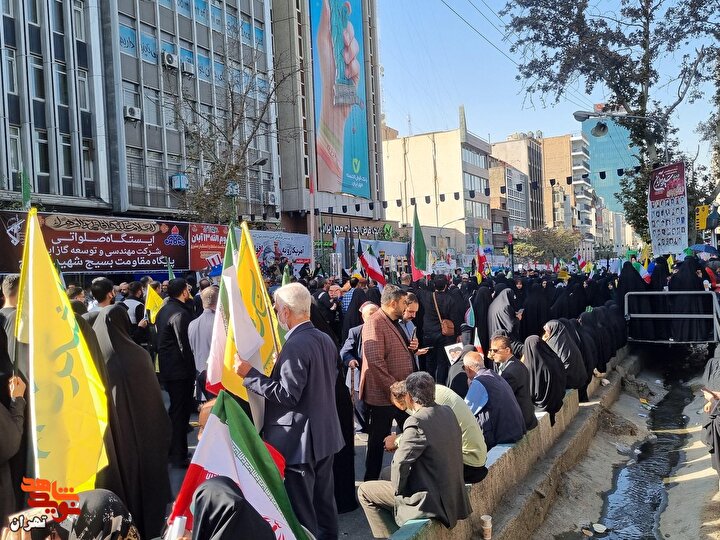
Ashura Mourning Ceremonies Held across the Globe
Navideshahed: The people in Iran and other countries around the world mourned on Ashura, the tenth day of the lunar month of Moharram, the martyrdom anniversary of Imam Hussein.

Ashura marks the climax of the Remembrance of Muharram.
Shii Muslims observe the day in mourning for Imam Hussein (PBUH) and in remembrance of his martyrdom.
In Iran, Iranians performed Ta'zieh, the old Iranian dramatic parade (post Islamic era).
Many people in Tehran and other Iranian cities cooked something and offered it to their neighbors as gifts.
Many public and private services were free in charity bases established by mourners including free clinics.
Many people in US, Pakistan, Malaysia, Turkey, Iraq, Syria, Afghanistan, Azerbaijan Republic, China, Italy, Kuwait, Croatia, Serbia, Austria and other countries, mourned the martyrdom anniversary of Imam Hussein (PBUH) on Tasua and Ashura.
It is commemorated by Shii Muslims as a day of mourning for the martyrdom of Hussein ibn Ali (PBUH), the grandson of the Messenger of Allah Hazrate Muhammad (PBUH) at the Battle of Karbala on 10 Muharram in the year 61 AH (October 2, 680 CE.)
In some Shii regions of Muslim countries such as Albania, Afghanistan, Iran, Iraq, Turkey, Azerbaijan, Pakistan, Lebanon, and Bahrain, the Commemoration of Hussein ibn Ali (PBUH) has become a national holiday and most ethnic and religious communities participate in it. Even in predominantly Hindu country like India, Ashura is a public holiday.
Imam Hussein (PBUH) in his path toward Kufa encountered the army of Ubaydollah ibn Ziyad, the governor of Kufa.
On October 10, 680 (Muharram 10, 61 AH), he and his small group of companions and family members, who were between 72 men fought with a large army of perhaps more than 100,000 men under the command of Umar ibn Sa'ad, son of the founder of Kufa.
Imam Hussein (PBUH) and all of his beloved followers were martyred while being thirsty.
The nearby river (Forat) was also blocked by Ubaydollah ibn Ziyad men and Imam Hussein (PBUH) and his companions were not allowed to get any water from it.
Imam Hussein's grave became a pilgrimage site among Shii followers only a few years after his martyrdom.
Monday was the day of Tasoa which was the 9th day of Muharram in the Islamic calendar.
The End
Source: IRIB News Agency
Ashura marks the climax of the Remembrance of Muharram. Shii Muslims observe the day in mourning for Imam Hussein (PBUH) and in remembrance of his martyrdom. In Iran, Iranians performed Ta'zieh, the old Iranian dramatic parade (post Islamic era). Many people in Tehran and other Iranian cities cooked something and offered it to their neighbors as gifts. Many public and private services were free in charity bases established by mourners including free clinics. Many people in US, Pakistan, Malaysia, Turkey, Iraq, Syria, Afghanistan, Azerbaijan Republic, China, Italy, Kuwait, Croatia, Serbia, Austria and other countries, mourned the martyrdom anniversary of Imam Hussein (PBUH) on Tasua and Ashura. It is commemorated by Shii Muslims as a day of mourning for the martyrdom of Hussein ibn Ali (PBUH), the grandson of the Messenger of Allah Hazrate Muhammad (PBUH) at the Battle of Karbala on 10 Muharram in the year 61 AH (October 2, 680 CE.) In some Shii regions of Muslim countries such as Albania, Afghanistan, Iran, Iraq, Turkey, Azerbaijan, Pakistan, Lebanon, and Bahrain, the Commemoration of Hussein ibn Ali (PBUH) has become a national holiday and most ethnic and religious communities participate in it. Even in predominantly Hindu country like India, Ashura is a public holiday. Imam Hussein (PBUH) in his path toward Kufa encountered the army of Ubaydollah ibn Ziyad, the governor of Kufa. On October 10, 680 (Muharram 10, 61 AH), he and his small group of companions and family members, who were between 72 men fought with a large army of perhaps more than 100,000 men under the command of Umar ibn Sa'ad, son of the founder of Kufa. Imam Hussein (PBUH) and all of his beloved followers were martyred while being thirsty. The nearby river (Forat) was also blocked by Ubaydollah ibn Ziyad men and Imam Hussein (PBUH) and his companions were not allowed to get any water from it. Imam Hussein's grave became a pilgrimage site among Shii followers only a few years after his martyrdom. Monday was the day of Tasoa which was the 9th day of Muharram in the Islamic calendar. The End Source: IRIB News Agency



